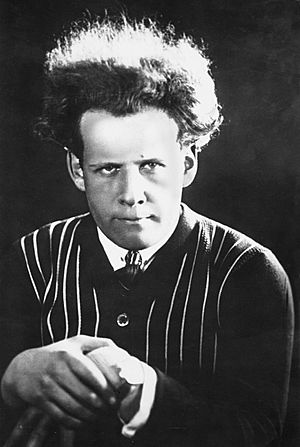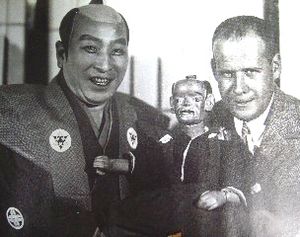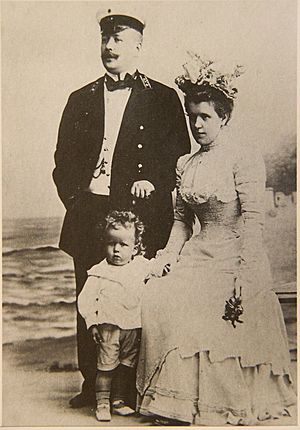Sergei Eisenstein facts for kids
Quick facts for kids
Sergei Eisenstein
|
|
|---|---|

Eisenstein in St. Petersburg, 1910s
|
|
| Born |
Sergei Mikhailovich Eizenshtein
22 January 1898 (O.S. 10 January 1898) Riga, Governorate of Livonia, Russian Empire
|
| Died | 11 February 1948 (aged 50) |
| Resting place | Novodevichy Cemetery, Moscow |
| Years active | 1923–1946 |
|
Notable work
|
|
| Spouse(s) | Pera Atasheva (birth name Pearl Fogelman) 1934–1948, his death |
| Awards | Stalin prize (1941,1946) |
Sergei Mikhailovich Eisenstein; (22 January 1898 - 11 February 1948) was a Soviet film director and film theorist, a pioneer in the theory and practice of montage. He is noted in particular for his silent films Strike (1925), Battleship Potemkin (1925) and October (1928), as well as the historical epics Alexander Nevsky (1938) and Ivan the Terrible (1944, 1958). In its decennial poll, the magazine Sight & Sound named his Battleship Potemkin the 11th greatest movie of all time.
Early life
Sergei Eisenstein was born on 22 January 1898 in Riga, in the Governorate of Livonia, Russian Empire (now Latvia), to a middle-class family. His family moved frequently in his early years, as Eisenstein continued to do throughout his life. His father, the architect Mikhail Osipovich Eisenstein, was born in the Kiev Governorate, to a Jewish merchant father, Osip, and a Swedish mother.
His father had converted to the Russian Orthodox Church while his mother, Julia Ivanovna Konetskaya, was from a Russian Orthodox family. She was the daughter of a prosperous merchant. Julia left Riga the same year as the 1905 Russian Revolution, taking Sergei with her to St. Petersburg. Her son would return at times to see his father, who joined them around 1910. Divorce followed and Julia left the family to live in France. Eisenstein was raised as an Orthodox Christian, but became an atheist later in life. Among the films that influenced Eisenstein as a child was The Consequences of Feminism by the first female filmmaker Alice Guy-Blaché.
Education
At the Petrograd Institute of Civil Engineering, Eisenstein studied architecture and engineering, the profession of his father. In 1918, he left school and joined the Red Army to participate in the Russian Civil War, although his father Mikhail supported the opposite side. This brought his father to Germany after the defeat of the anti-Bolshevik forces, and Sergei to Petrograd, Vologda, and Dvinsk. In 1920, Sergei was transferred to a command position in Minsk, after success providing propaganda for the October Revolution. At this time, he was exposed to Kabuki theatre and studied Japanese, learning some 300 kanji characters, which he cited as an influence on his pictorial development.
Career

Eisenstein moved to Moscow in 1920, and began his career in theatre. His productions there were entitled Gas Masks, Listen Moscow, and Enough Stupidity in Every Wise Man. His first film, Glumov's Diary (for the theatre production Wise Man), was also made in that same year with Dziga Vertov hired initially as an instructor.
Strike (1925) was Eisenstein's first full-length feature film. Battleship Potemkin (also 1925) was critically acclaimed worldwide. Mostly owing to this international renown, he was then able to direct October: Ten Days That Shook the World, as part of a grand tenth anniversary celebration of the October Revolution of 1917, and then The General Line (also known as Old and New). While critics outside Soviet Russia praised these works, Eisenstein's focus in the films on structural issues such as camera angles, crowd movements, and montage brought him and like-minded others such as Vsevolod Pudovkin and Alexander Dovzhenko under fire from the Soviet film community.
Eisenstein's Alexander Nevsky was critically well-received by both the Soviets and in the West. The film won him the Order of Lenin and the Stalin Prize.
Eisenstein's film Ivan the Terrible, Part I, presenting Ivan IV of Russia as a national hero, won Stalin's approval (and a Stalin Prize), but the sequel, Ivan the Terrible, Part II, was criticized by various authorities and went unreleased until 1958. All footage from Ivan the Terrible, Part III was confiscated by the Soviet authorities whilst the film was still incomplete, and most of it was destroyed, though several filmed scenes exist.
Death
Eisenstein suffered a heart attack on 2 February 1946, and spent much of the following year recovering. He died of a second heart attack on 11 February 1948, at the age of 50. His body lay in state in the Hall of the Cinema Workers before being cremated on 13 February, and his ashes were buried in the Novodevichy Cemetery in Moscow.
Honours and awards
- Two Stalin Prizes – 1941 for the film Alexander Nevsky (1938), 1946 for the first film of the series Ivan the Terrible (1944)
- Honored Artist of the RSFSR (1935)
- Order of Lenin (1939) – for the film Alexander Nevsky (1938)
- Order of the Badge of Honour
Filmography
- 1923 "Дневник Глумова" ("Glumov's Diary", short)
- 1925 Стачка (Strike)
- 1925 Броненосец Потёмкин (Battleship Potemkin)
- 1928 Октябрь «Десять дней, которые потрясли мир» (October: Ten Days That Shook the World)
- 1929 Буря над Ла Сарра (The Storming of La Sarraz, with Ivor Montagu and Hans Richter, lost)
- 1929 Старое и новое «Генеральная линия» (The General Line, also known as Old and New)
- 1930 "Romance sentimentale" (France)
- 1931 "El Desastre en Oaxaca" (Mexico)
- 1938 Александр Невский (Alexander Nevsky)
- 1944 Иван Грозный 1-я серия (Ivan the Terrible, Part I)
- 1958 Иван Грозный 2-я серия (Ivan the Terrible, Part II, completed in 1946)
Images for kids
See also
 In Spanish: Serguéi Eisenstein para niños
In Spanish: Serguéi Eisenstein para niños



